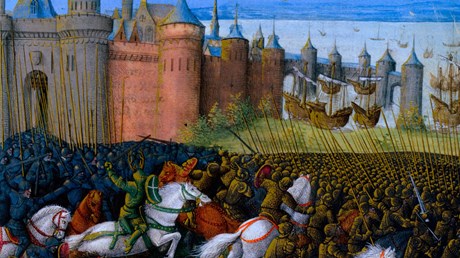A series of holy wars against Islam led by power-mad popes and fought by religious fanatics? Think again.

With the possible exception of Umberto Eco, medieval scholars are not used to getting much media attention. We tend to be a quiet lot (except during the annual bacchanalia we call the International Congress on Medieval Studies in Kalamazoo, Michigan, of all places), poring over musty chronicles and writing dull yet meticulous studies that few will read. Imagine, then, my surprise when within days of the September 11 attacks, the Middle Ages suddenly became relevant.
As a Crusade historian, I found the tranquil solitude of the ivory tower shattered by journalists, editors, and talk-show hosts on tight deadlines eager to get the real scoop. What were the Crusades?, they asked. When were they? Just how insensitive was President George W. Bush for using the word crusade in his remarks? With a few of my callers I had the distinct impression that they already knew the answers to their questions, or at least thought they did. What they really wanted was an expert to say it all back to them. For example, I was frequently asked to comment on the fact that the Islamic world has a just grievance against the West. Doesn't the present violence, they persisted, have its roots in the Crusades' brutal and unprovoked attacks against a sophisticated and tolerant Muslim world? In other words, aren't the Crusades really to blame?
Osama bin Laden certainly thinks so. In his various video performances, he never fails to describe the American war against terrorism as a new Crusade against Islam. Ex-president Bill Clinton has also fingered the Crusades as the root cause of the present conflict. In a speech at Georgetown University, he recounted (and embellished) a massacre of Jews after the Crusader conquest of Jerusalem in 1099 …
Source: Christianity Today Most Read